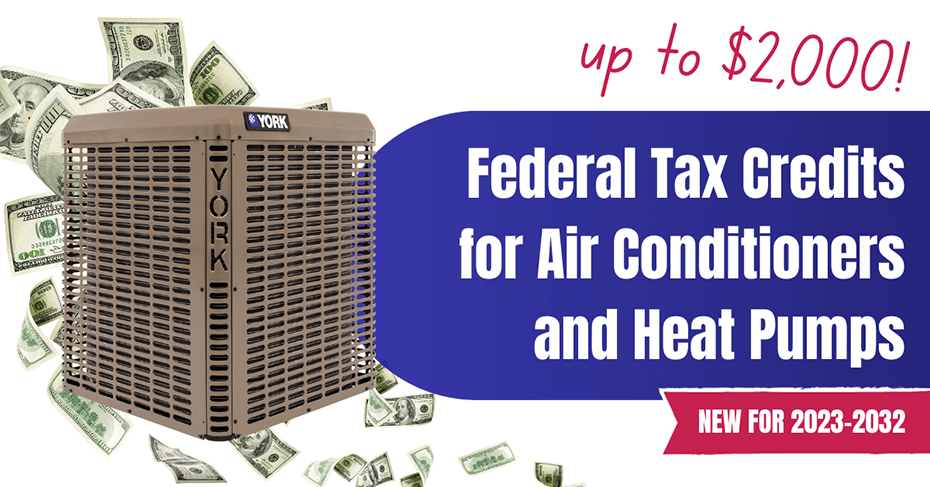Federal Tax Credits for Air Conditioners and Heat Pumps [2023]

Not only can upgrading to a more energy efficient air conditioner or heat pump lower your energy bills, but it can also save you some cash come tax season. We’ll tell you how.
First, some background. On January 1, 2023, federal tax credit provisions under the Inflation Reduction Act came into effect. These Energy Efficient Home Improvement tax credits help reduce the cost of certain upgrades to homes and businesses—including air conditioners, heat pumps, and other home appliances and upgrades.
Though the requirements are more complex than previous credits, the maximum credit amount available to you is also much higher. The Energy Efficient Home Improvement tax credits are available for equipment installed between January 1, 2023-December 31, 2032. (Go here for tax credit information for 2022 and earlier.)
What Tax Credits are Available?
You can receive a tax credit that equals 30% of qualifying expenses on certain upgrades to your home’s energy efficiency. The maximum credit per year is $3,200, through 2032. The following types of equipment and improvements are eligible when they meet certain specifications:
- Air Source Heat Pumps
- Air conditioners
- Furnaces
- Heat pump water heaters
- Insulation
- Doors and windows
- Electrical panel upgrades
- Home energy audits
- And more
For a full list of home improvements that qualify for tax credits, visit energystar.gov.
Annual Aggregate Limits
While the maximum credit is $3,200 per year, there are also limits on certain types of qualifying equipment and upgrades in the following two categories:
- Up to $2,000 per year for any combination of air source heat pump, heat pump water heater, and biomass stove/boiler upgrades.
- Up to $1,200 per year for any combination of central air conditioners, furnaces, and boilers, plus improvements to the home envelope (windows, doors, skylights, insulation, electrical).
Because of the annual aggregate limits above, spreading your home energy efficiency upgrades over a few years with allow you to maximize your savings. Also, GeoThermal heat pumps and other renewable energy equipment are eligible for a separate tax credit (the Residential Clean Energy Credit). Upgrades under that credit do not count against the $3,200 annual limit for Energy Efficient Home Improvement tax credits.
What Federal Tax Credits are Available for Air Conditioners and Air Source Heat Pumps?
There are also limits on how much credit you can receive per project. Below, you’ll find more details about the federal tax credits available for air conditioners and heat pumps. To learn more about the tax credits available for other types of home energy efficiency upgrades, refer to energystar.gov.
Air Conditioners
- You can claim: 30% of the project cost, up to a $600 maximum limit, of systems meeting the requirements below.
- Split Systems must be ENERGY STAR Certified** with SEER2* (Seasonal Energy Efficiency Ratio 2) greater than or equal to 16. (Find ENERGY STAR certified systems here.)
- All ENERGY STAR certified Packaged Systems are eligible.
- The air conditioning system must be purchased and installed between January 1, 2023, and December 31, 2032.
Air Source Heat Pumps
- You can claim: 30% of the project cost, up to a $2,000 maximum limit, of systems meeting the requirements below.
- In the Southern United States, all Ducted Heat Pumps that have earned the ENERGY STAR label are eligible***. (Find ENERGY STAR certified heat pumps here.)
- In the Southern United States, ENERGY STAR certified Mini-Split (a.k.a. Ductless or Non-Ducted) Systems with SEER2 at least 16, EER2 at least 12 and HSPF2 at least 9, are eligible.
- In the Northern United States, heat pumps must meet different requirements. Visit ENERGYSTAR for more information.
- The heat pump system must be purchased and installed between January 1, 2023, and December 31, 2032.
 Qualifying York HVAC Equipment
Qualifying York HVAC Equipment
The following York air conditioner and heat pump models qualify for federal tax credits:
- Qualifying York Air Conditioner models include: YC2F, YXT, YXV
- Qualifying York Heat Pump models include: YH2F, YZT, YZV
Unsure of whether your new air conditioner or heat pump qualifies for the tax credit? Ask your Symbiont Service HVAC installer. We may also be able to provide you with a Manufacturer Certification Statement.
Does My Home Qualify?
The Energy Efficient Home Improvement tax credit is for residential properties only, with some restrictions as follows:
- The property must be your principal residence (not a vacation home, second home, commercial property, etc.). Your principal residence is where you live most of the time. It could be a:
- House
- Houseboat
- Mobile home
- Cooperative apartment
- Condominium
- Manufactured home
- It must be an existing home, not new construction.
- You must own the property. Rental properties do not apply.
- The property must be in the United States.
- If you use your home for business, your tax credit eligibility will depend on factors outlined by the IRS in this article. As a general rule, if business use of your home is 20% or less, you are eligible for the full credit.
What About Tax Credits for Air Conditioners or Heat Pumps Purchased in 2022 or Earlier?
Did you invest in a new air conditioner or heat pump in 2022 or before? If you haven’t already done so, you may be able to claim a tax credit under the Non-Business Energy Property Credit. Read more about the 2022 tax credits.
Are There Tax Credits for Homebuilders and Commercial Properties?
If you are a home builder or a commercial building owner/designer, you may be eligible for separate tax credits. Read more at the links below:
What About Tax Credits for GeoThermal HVAC Systems?
There are also tax credits for renewable energy upgrades, including GeoThermal heat pumps, available under the Residential Clean Energy Credit. Tax credits received for GeoThermal systems and other renewable energy upgrades do not count toward the $3,200 annual limit under the Energy Efficient Home Improvement tax credits. Learn more about the tax credit for GeoThermal AC systems.
How Do I Apply for the Tax Credits?
To claim the tax credits, you will need to fill out IRS form 5695, Residential Energy Credits and file it with your tax returns.
Important Information
- You can only claim these tax credits if you owe tax. If you do not owe tax, you will not receive the tax credit as a refund, and you can’t rollover any excess credit to future tax years.
- If you received subsidies, rebates, or other financial incentives toward your air conditioner or heat pump purchase, you may need to subtract these from your expenses when you calculate your tax credit.
- We highly recommend consulting a tax professional for advice on claiming tax credits. Tax credits are administered by the IRS, and the credit amounts you may receive are subject to IRS regulations. For the most current information on federal tax credits, please visit energystar.gov and IRS.gov.
DISCLAIMER: The tax credit information contained within this website is provided for informational purposes only and we do not guarantee the accuracy of the information provided. It is not intended to substitute for expert advice from a professional tax/financial planner or the Internal Revenue Service (IRS). Symbiont Service Corp does not offer tax advice. We recommend you talk to your accountant or other tax professional. For the most up-to-date information on federal tax credits, please visit energystar.gov and IRS.gov.
*SEER2, HSPF2, and EER2 replaced SEER, HSPF, and EER as the standard rating system for HVAC system energy efficiency on January 1, 2023, following the introduction of new testing procedures. For more information, visit: https://seer2.com
**Note from ENERGY STAR: Under the tax code, eligible equipment must “meet or exceed the highest efficiency tier (not including any advanced tier) established by the Consortium for Energy Efficiency which is in effect as of the beginning of the calendar year.” The eligibility described above is consistent with this requirement.”
***Note from ENERGY STAR: Currently, eligible equipment must “meet or exceed the highest efficiency tier (not including any advanced tier) established by the Consortium for Energy Efficiency which is in effect as of the beginning of the calendar year.” The eligibility requirements are subject to change based on the final CEE Criteria and the Internal Revenue Service (IRS).
Last Updated: January 5, 2024
Stay In The Loop
Don't miss out! Like us on Facebook or subscribe to our RSS Feed on Feed Burner and get our latest posts. Our symbiontairconditioning.com blog includes posts about topics related to air conditioning and our company. Posts about additional topics can be found on our main company blog at symbiontservice.com/blog/.




